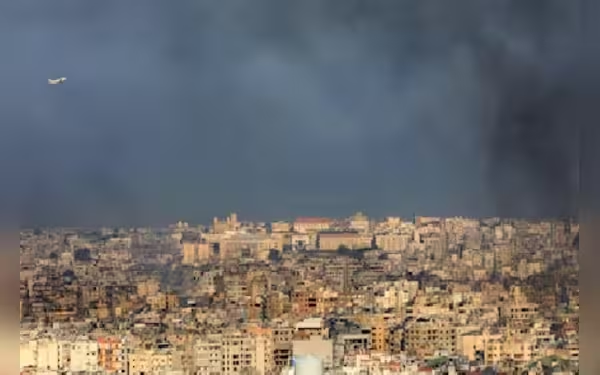Sunday, October 6, 2024 12:37 AM
Middle East Chaos Following Nasrallah's Assassination
- Hezbollah leader's assassination escalates regional violence.
- Palestinians face intensified struggles amid military occupation.
- Calls for peace emerge amidst ongoing humanitarian crises.
 Image Credits: thefrontierpost
Image Credits: thefrontierpostThe assassination of Hezbollah's Nasrallah has led to chaos in the Middle East, intensifying humanitarian crises and calls for peace.
The Middle East is currently witnessing a tumultuous period, marked by violence and instability. The recent assassination of Hezbollah leader Hassan Nasrallah by the Israeli military, dubbed "Operation New Order," has sparked widespread chaos rather than the intended order. This situation is not just a political issue; it is a humanitarian crisis affecting millions of lives across Lebanon, Palestine, and other Arab nations.
For decades, Palestinians have endured military occupation, and the last year has only intensified their struggles. The situation in Gaza has become dire, with Israeli military actions rendering it nearly uninhabitable. In the West Bank, illegal settlements continue to expand, leading to daily confrontations and casualties. The plight of the Palestinian people is a stark reminder of the ongoing quest for freedom and independence, which seems increasingly elusive.
Lebanon, too, is feeling the repercussions of this conflict. The civilian population has suffered immensely, with hundreds losing their lives as Israeli forces escalate their military operations. The Lebanese government finds itself powerless, merely observing as the conflict unfolds. The violence this time feels different, with a significant number of Hezbollah leaders being targeted, raising questions about the future stability of Lebanon.
Meanwhile, Yemen, already grappling with one of the worst humanitarian crises globally, is caught in the crossfire between Iranian-backed groups and Israeli military actions. The Houthi rebels' attempts to strike Israel have not altered the broader strategies of the Israeli government, which continues to bomb key locations in Yemen without facing substantial international backlash.
Other nations in the region are also affected. Syria has seen a surge in bombings, leading to a wave of refugees fleeing the chaos in Lebanon. In Iraq, the situation is evolving as Iran-aligned militias gain ground, coinciding with the U.S. decision to withdraw troops from the country. The internal dynamics within Israel are equally concerning, as the population grapples with the trauma of the October 7 attack by Hamas, which claimed over 1,200 lives in a single day.
Despite the grim outlook, there is a glimmer of hope. While militaristic and extremist voices dominate the narrative, many individuals and groups across the region are advocating for peace. Their vision of a "new order" based on dialogue and understanding is crucial for a better future. It is essential for the international community to support these voices and work towards a resolution that prioritizes peace over conflict.
The Middle East stands at a crossroads. The current trajectory, characterized by violence and chaos, need not be the only path forward. By embracing the ideals of peace and cooperation, there is potential for a new order that fosters stability and prosperity for all nations involved. The time for change is now, and it is up to the people of the region and the global community to champion this cause.













